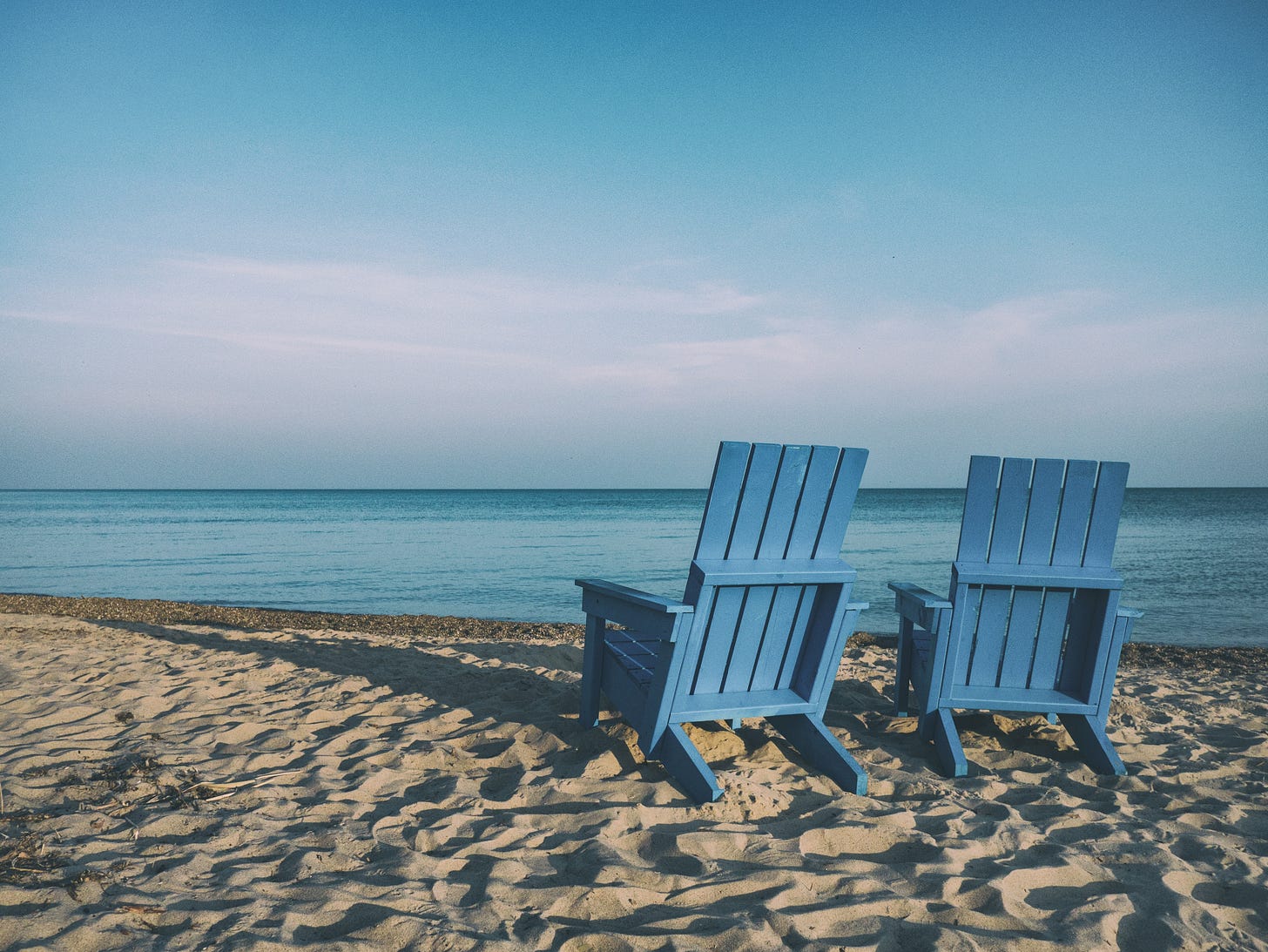Welcome to Thursday Things! If you enjoy this edition, please click the heart icon in the heading or at the end of the post to let me know. You can also post a comment by clicking the dialogue bubble next to the heart.
Ah, to reach the beach. And take a nap in the sun. Photo by Aaron Burden on Unsplash
I am weary this week from losing sleep, which somewhat shortens and colors this edition of Thursday Things.
One discovery this week was Dr. Andrew Huberman, a Professor of Neuroscience & Lab Director, at Stanford University who has done some fascinating research into “optimizing performance in high stress environments, enhancing neural plasticity, mitigating stress, and optimizing sleep.” There is a lot of material from him online in various interviews and videos. I will link today to a short interview on the Finding Mastery site: Dr. Andrew Huberman On How The Brain Makes Sense Of Stress, Fear, And Courage
A lot of people are jet lagged at home. They’re looking at screens at night and they’re not getting enough photons or light in their eyes during the day and their severe mood disruptions. That pattern of behavior actually triggers a pro-depressive circuit. There’s good evidence for that now. If the light comes in at the right time of day, you get an elevation in mood. If the light comes in at the wrong time of day, meaning at night, in the middle of the night, in particular between the hours of 11:00 PM and 4:00 AM, you get activation of this pro-depressive circuit that’s also signaled to the pancreas.\
Here is another useful suggestion from Dr. Huberman, about getting exposure to morning sunlight. I actually tried this today and set out on a long walk this morning, which is why today’s edition is coming later than usual!
How to sleep better
If you’re not sleeping great, view light early in the day, close to when you wake up, hopefully that’s in the morning. Ideally at sunlight, yes, it could be through a window, but ideally you would be outside and you just get two minutes to 10 minutes of sunlight. … And a lot of light energy is coming through, far more than you’re going to get from artificial lights. The other thing is to get some sunlight in your eyes in the evening as the sun is setting because it sets the appropriate timing of secretion of this hormone, cortisol, which will make you alert at the right times of day. And you want cortisol dropping by about 9:00 PM. And in the psychiatric community, it’s well known that a peak in 9:00 PM cortisol is kind of a signature of anxiety and depression and it’s related to things like insomnia. You want cortisol up early in the day. You don’t want it coming up late in the day.
You can follow Dr. Andrew Huberman on Instagram at https://www.instagram.com/hubermanlab/ where he shares a lot of interesting and useful information about how our brains work and how we can get them to work better for us.
Today is the best time ever to be a mouse! Inhibiting KGA-dependent glutaminolysis in mice found to eliminate senescent cells Seriously, mice get all the best medical breakthroughs years before people do, if ever.
Cells are described as senescent when they lose the ability to divide. Prior research has found that cells can reach senescence due to exposure to stress, which can include mitochondrial, replicative or oxidative stress. In all cases, the cells live and continue to function, but can no longer divide. Prior research has found evidence suggesting that senescent cells play a role in the development of some aging-related diseases such as arteriosclerosis and muscle degeneration. For that reason, scientists have been looking for ways to eliminate them. In this new effort, the researchers have found a way to rid test mice of senescent cells by removing a pathway necessary for their continued survival.
Lots of big science words. The point is that a new RNA interference treatment can reduce or prevent some of the deleterious effects of aging. “The researchers suggest that inhibiting a similar enzyme in humans could likely promote senescent cell death as well, and by extension, reduce age-related disease.” Even better, here is a cartoon that explains things better:
Source: University of Tokyo
This is one case where he probably wishes he had chosen an easy password like his dog’s name or his birthday. Programmer has two password guesses left to save his $240 million of Bitcoin
That's the unenviable situation facing Stefan Thomas, who has lost the password to a hard drive containing 7,002 Bitcoin.
The New York Times reports that the German-born programmer, who lives in San Francisco, was given the haul of Bitcoin over a decade ago, back when they were worth just a few dollars each. Thomas stored them in a digital wallet on his IronKey hard drive and wrote the password down on a piece of paper, which he lost. With the price of Bitcoin surging recently, that drive now has around $240 million on it.
The IronKey allows for ten incorrect passwords before its contents are permanently encrypted. Thomas already has eight failed attempts.
No pressure on those last two guesses.
Sleepy kitty. Photo by Wes Hicks on Unsplash
Thank you for reading Thursday Things. Again, please click the hearts, comment, and use the share button to send this issue to a friend who might enjoy it. See you next Thursday!





